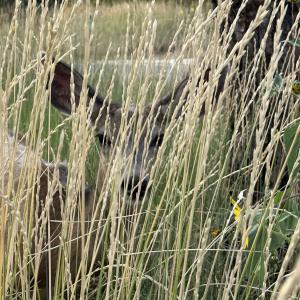When
The Art and Science of Developing a Menu of Climate Change Adaptation Actions for Managing Wildlife and Ecosystems
Presenters:
Stephen Handler (USDA Forest Service and Northern Institute of Applied Climate Science)
Dr. Benjamin Zuckerberg (University of Wisconsin-Madison)
Jacy Bernath-Plaisted (University of Wisconsin-Madison)
Abstract:
The Adaptation Workbook is a structured process to consider the potential effects of climate change and design land management and conservation actions that can help prepare for changing conditions. The process is completely flexible to accommodate a wide variety of geographic locations, ownership types, ecosystems and land uses, management goals, and project sizes. Our webinar will detail the broader process of developing a menu of climate adaptation strategies and approaches for terrestrial wildlife management to help managers translate broad concepts into specific tactics that will respond to climate change risks and meet desired management goals. We will present a recent application of this process for managing wildlife populations and their habitat. We will further demonstrate an ecosystem-specific application for developing climate adaptation strategies for vulnerable grassland systems. Understanding how climate change might affect ecosystems and wildlife is of mounting concern, and developing real-world climate adaptation plans is an essential tool for conservation practitioners and managers.
Registration link: Register in advance for this meeting:
https://cuboulder.zoom.us/meeting/register/tJMsf-6przoqGtN28RO1e9aTCRjCCu0lo5sf
After registering, you will receive a confirmation email containing information about joining the meeting.
About the speakers:
Stephen Handler
Stephen Handler works for the USDA Forest Service Northern Research Station and is the acting Deputy Director of the Northern Institute of Applied Climate Science. He works across the upper Midwest, building partnerships, assessing climate change risk, and working with forest managers and landowners to develop real-world adaptation projects. Stephen moved to Houghton, MI, in 2011 and loves being a Yooper.
Benjamin Zuckerberg
Dr. Benjamin Zuckerberg is a professor in the Department of Forest and Wildlife Ecology at the University of Wisconsin-Madison. Growing up in Brooklyn, New York, Ben was a latecomer to ecology, but in his undergraduate years he quickly became fascinated by how birds respond to environmental change. Ben received his MS from the University of Massachusetts-Amherst and doctorate from the State University of New York where he then went on to serve as a research associate at the Cornell Lab of Ornithology. His research focuses on how modern climate change and habitat loss influence wildlife behavior, abundance, and distribution. Members of his lab often work closely with natural resource managers to provide guidance on various aspects of climate change adaptation.
Jacy Bernath-Plaisted
Jacy is a PhD candidate in the Department of Forest and Wildlife Ecology at the University of Wisconsin-Madison. Jacy grew up on 12 acres in rural Michigan and has always had a strong connection to wildlife and the outdoors. In 2015, he completed his master’s degree in natural resources management at the University of Manitoba. Following his master’s degree, Jacy went on to hold a position as an avian ecologist with Bird Conservancy of the Rockies prior to beginning his dissertation in 2019. Throughout his career, Jacy has had a strong focus on avian demography and life-history, the ecology and conservation of grasslands and grassland birds, and related topics in applied management. Most recently, his dissertation work has focused on the importance of microclimate variation in temperate grasslands.


